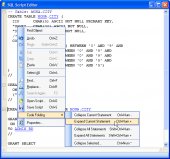MaxDB Maestro online Help
| Prev | Return to chapter overview | Next |
Setting index properties
The topic contains detailed description for all MaxDB index properties.
 Unique Index
Unique Index
If checked, creates a unique index for the table, i.e. the database system ensures that no two rows of the specified table have the same values in the indexed columns. In this way, if two rows both contain the NULL value for all columns of an index, the two index values are not considered to be identical. If at least one column does not contain the NULL value, two rows that have the same value in all non-NULL columns are considered to be identical.
 Primary key constraint
Primary key constraint
With this option checked this field becomes a compound primary key. It is useful in case the table has more than one primary key.
Active
The option defines whether the index can be used for the search. In case it's off it continues to be changed when the SQL statements INSERT, UPDATE, or DELETE are used.
Init usage
Check the option to restart the mechanism that counts how often the index is used.
| Prev | Return to chapter overview | Next |




 Download
Download Buy
Buy
